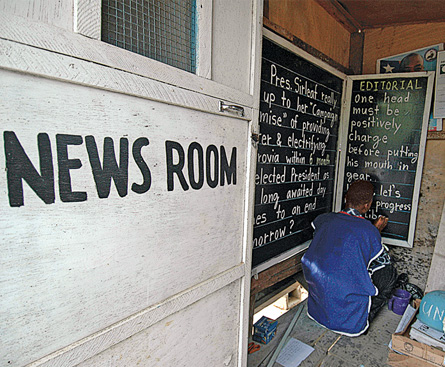
The Problem:
Historically a “pay for play” business model has dominated media in many low income countries. Journalists are not paid by employers but instead earn their income in gifts or bribes from those they write about. Media is a megaphone for interested parties to spread misinformation that serves their interests, leading to corrupt institutions and the misallocation of resources.
The only thing worse than no information is misinformation
The Solution:
New Narratives believes that no media capacity building project can be successful without supporting the journalism ecosystem, including media businesses. Without financial independence newsrooms cannot do independent journalism. For this reason, New Narratives targets “standard setters” in each market—news organizations that uphold and raise journalistic standards.
We support partner news organizations with inclusive digital transformation of business models and newsgathering and with grant making for investigative, solutions and explanatory journalism. Our model has resulted in awards, higher pay and societal acclaim for partners. That, in turn, has created a virtuous cycle that incentivizes honest, independent reporting across the market.
Inclusive Reporting:
NN fellows are 50/50 men and women. Our fellows are high profile role models in society. Our women journalists, in turn, interview women leaders giving another group of women a public platform to increase their credibility. Boosting the number of women in our media outlets also serves our primary goal of building their financial independence. Half the audience is women. Hiring women makes good business sense.
NN reporters also come from other minority groups and from regional areas ensuring voices from every part of our target countries are heard.
Impact:
NN has covered taboo subjects such as female genital cutting, child labor, teen prostitution, peacekeeper abuse of women, rape. We have covered corruption and mismanagement in oil, mining and forestry industries. And we have documented West Africans’ long quest for post-war and contemporary justice. Our reporting has forced reform and action including a ban on female genital cutting and the passage of a law supporting a war crimes court. We have highlighted the work of innovators, many of them women, and spread good ideas.
NN journalists have contributed to The New York Times, Newsweek/Daily Beast, The Guardian, Reuters, PBS Newshour, Foreign Policy, US public radio and the Christian Science Monitor.
Our reporters have won acclaim abroad with the Committee to Protect Journalists’ International Press Freed prize, Canadian Journalists for Free Expression and awards from Reporters Without Borders, the Pulitzer Center, Thomson Reuters, GIZ, the KAS Wits University Fellowship and the UN Dag Hammarskjold fellowship.
